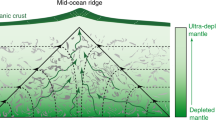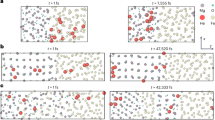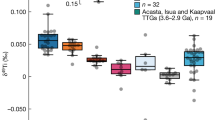Abstract
THE 3He/4He ratio in deep Pacific water is 20–30% higher than in atmospheric helium because of injection of primordial helium from the mantle1,2. The largest 3He enrichments in the Pacific have been found in water on the crest of the East Pacific Rise where the isotopic ratios indicate2 that the excess helium component has a 3He/4He ratio about ten times the atmospheric ratio, in agreement with the ratios measured in trapped helium in the glassy rims of oceanic tholeiites3,4. Recent measurements in this laboratory5 have shown that the hot brines in the axial rift of the Red Sea are very highly enriched in mantle helium. 3He and 4He are respectively 3300 and 380 times supersaturated relative to atmospheric solubility equilibrium in seawater, with a 3He/4He ratio of 1.2×10−5, or 8.6 times the ratio in atmospheric helium. Comparison of the enrichments of various elements in the Red Sea brines and in brines associated with salt domes6 shows that helium is the only component in the Red Sea brines which unequivocally requires derivation from hydrothermal circulation of seawater in basalts. The helium isotopes are thus an extremely powerful and sensitive tracer for the detection and mapping of hydrothermal systems in oceanic spreading centres.
This is a preview of subscription content, access via your institution
Access options
Subscribe to this journal
Receive 51 print issues and online access
$199.00 per year
only $3.90 per issue
Buy this article
- Purchase on Springer Link
- Instant access to full article PDF
Prices may be subject to local taxes which are calculated during checkout
Similar content being viewed by others
References
Clarke, W. B., Beg, M. A. & Craig, H. Earth planet. Sci. Lett. 6, 213 (1969).
Craig, H., Clarke, W. B. & Beg, M. A. Earth planet. Sci. Lett. 26, 125 (1975).
Lupton, J. E. & Craig, H. Earth planet. Sci. Lett. 26, 133 (1975).
Craig, H. & Lupton, J. E. Earth planet. Sci. Lett. 31, 369 (1976).
Lupton, J. E., Weiss, R. F. & Craig, H. Nature 266, 244 (1977).
Craig, H., Hot Brines and Recent Heavy Metal Deposits in the Red Sea, (eds Degens, E. T. and Ross, D. A.) 208–242 (Springer-Verlag, New York, 1969).
Sclater, J. G. & Klitgord, K. D. J. geophys. Res. 78, 6951 (1973).
Williams, D. L., Von Herzen, R. P., Sclater, J. G. & Anderson, R. N. Geophys. J. R. Astr. Soc. 38, 587 (1974).
Weiss, R. F. et al., Trans. Am. Geophys. Union 57, 935 (1976).
Weiss, R. F. et al. Nature 267, 600–603 (1977).
Chung, Y-C & Craig, H. Earth planet. Sci. Lett. 14, 55 (1972).
Craig, H. & Weiss, R. F. Earth planet. Sci. Lett. 10, 289 (1971).
Ross, D. A. Science 175, 1455 (1972).
Dymond, J. & Hogan, L. Earth planet. Sci. Lett. 20, 131 (1973).
Author information
Authors and Affiliations
Rights and permissions
About this article
Cite this article
LUPTON, J., WEISS, R. & CRAIG, H. Mantle helium in hydrothermal plumes in the Galapagos Rift. Nature 267, 603–604 (1977). https://doi.org/10.1038/267603a0
Received:
Accepted:
Issue Date:
DOI: https://doi.org/10.1038/267603a0
This article is cited by
-
Developing a new, passive diffusion sampler suite to detect helium anomalies associated with volcanic unrest
Bulletin of Volcanology (2015)
-
Mantle-derived helium in two Peruvian hydrothermal ore deposits
Nature (1987)
-
Hydrothermal methane plumes in the Mariana back-arc spreading centre
Nature (1986)
-
Submarine hydrothermal vents and associated gradient environments as sites for the origin and evolution of life
Origins of life and evolution of the biosphere (1985)
Comments
By submitting a comment you agree to abide by our Terms and Community Guidelines. If you find something abusive or that does not comply with our terms or guidelines please flag it as inappropriate.



